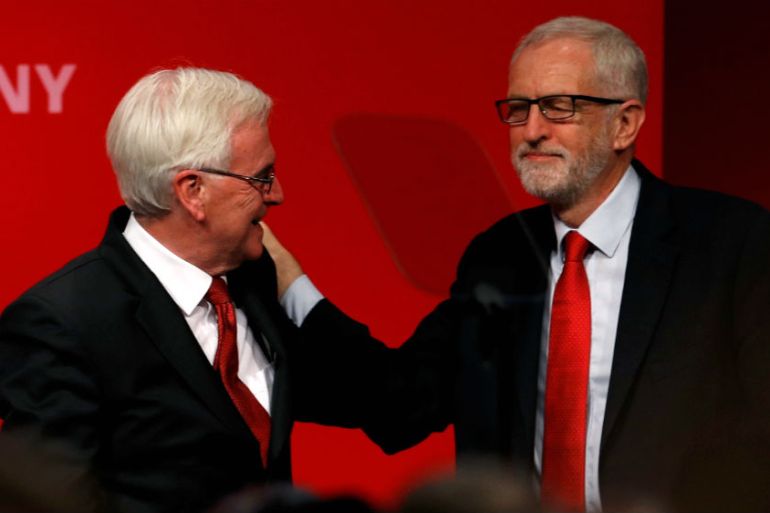Labour denies ‘civil war’ ahead of Brexit showdown
Jeremy Corbyn may find himself forced to abandon his Brexit ‘neutrality’ and back the UK remaining in the EU.

With the United Kingdom‘s ruling Conservative Party riddled with divisions over the country’s withdrawal from the European Union and unable to command a governing majority in a now-suspended parliament, principal opposition Labour Party is facing its own Brexit showdown on Monday.
The left-wing party’s many factions are divided between those wanting to campaign to cancel Brexit and those backing the wait-and-see approach of party leader Jeremy Corbyn.
Keep reading
list of 4 itemsWhy are British farmers pleading for a universal basic income?
Northern Ireland agreement could end deadlock, restore government
Forced to become British: How Brexit created a new European diaspora
Corbyn has called for a neutral position going into a general election, saying he would negotiate a new Brexit deal with Brussels that would then be put to a public referendum.
It remains unclear if Labour would then campaign to support its own deal, or to remain in the EU. The party’s position would be decided at a special conference, after the expected general election.
Shadow chancellor John McDonnell, who has said he would campaign for a Remain vote in the promised referendum, said Corbyn’s suggested process was “logical” and insisted “there isn’t any war in the Labour Party” over the issue.
|
|
As Labour’s national executive prepared to open the party’s annual conference over the weekend, a sudden proposal emerged on Friday designed to remove Tom Watson – the deputy leader of the party who had questioned Corbyn’s approach and said Labour should campaign to remain in the EU and abandon any ambiguity.
The bid failed but exposed again the deep divisions within the party.
Trade unions split
Britain’s trade union movement, which sees the Labour Party as its political embodiment, provides key power bases commanding significant influence within the party.
The result of the Brexit vote will hinge on whether the unions decide to back Corbyn’s position.
Unison – the country’s largest trade union with 1.4 million members – will reportedly vote against Corbyn on Monday, and instead support the motion calling for Labour to campaign to remain.
Most other unions are expected to support Corbyn’s position, with Unite boss Len McCluskey suggesting senior Labour figures such as Watson should either get in line or “step aside” from their shadow cabinet roles – before calling for party unity.
“I implore you, please give Jeremy the support he needs later so that prime minister Corbyn can lead us to a bright new dawn,” he told the conference.
“Our country is crying out for an alternative to austerity economics and neoliberal dogma that has just thrown Thomas Cook to the wall, along with thousands of jobs.”
|
|
The vote, expected around 16:00 GMT, is likely to be close and could see Corbyn – a lifelong sceptic of the EU – forced to change his position.
Free elderly care
Party divisions over Brexit, left-wing ideology, and the role of unions threaten to overshadow other policies being unveiled and debated at the conference in the southern seaside town of Brighton.
Finance chief McDonnell used his keynote speech on Monday to confirm plans for Labour to fund free personal care for elderly people in England.
The pledge, which would cost an estimated 6 billion pounds ($7.5bn) a year in 2020-21, would more than double the number of people receiving state-funded support, Labour said.
At a rally on Sunday night, McDonnell indicated a pledge to reform the social security system, including scrapping the widely criticised Universal Credit system, would be included in Labour’s first legislative agenda after winning power in the election, which is widely expected in the coming few months.
He said there had to be a proper social security “safety net”.
“That has to be on the basis of enabling people to have a decent quality of life with an adequate income.
That has to mean getting rid of the bloody Universal Credit,” McDonnell said.